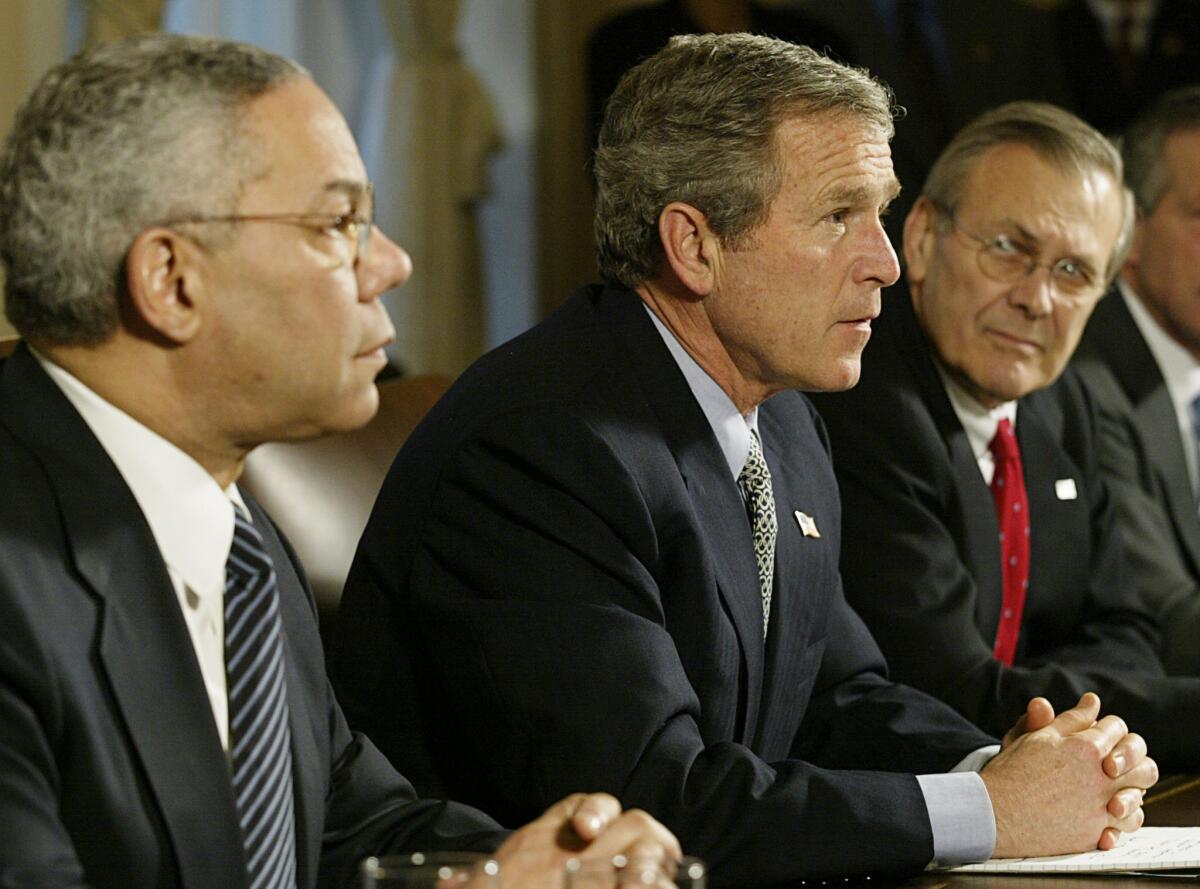Colin Powell backs Iran deal as Congress prepares for a vote

Then-Secretary of State Colin Powell attends a Cabinet meeting at the White House with President George W. Bush and then-Secretary of Defense Donald Rumsfeld on March 20, 2003.
Momentum continued to build for the Iran nuclear deal Sunday with backing from Republican former Secretary of State Colin Powell, just as Congress prepares to launch a debate likely to end with a highly partisan vote.
The Republicans who control Congress almost unanimously oppose the accord, which was negotiated by the White House and diplomats from other leading nations to curtail Iran’s nuclear ambitions. But with a large majority of Democrats supporting the deal, President Obama is all but assured of the votes to prevent opponents from blocking it.
Another top Democrat, Rep. Debbie Wasserman Schultz of Florida, the party’s chairwoman, announced Sunday she would back the deal. Her support is significant because she represents a Florida district with many Jewish voters who worry about the threat Iran poses to Israel. The Israeli government has been a leading force in opposing the deal.
Although a number of House Democrats have not yet declared their position, Democratic leader Nancy Pelosi has said she is confident of having the votes to sustain the deal in that chamber. Democrats already have enough support on record to do so in the Senate.
Powell served as national security advisor to President Reagan and chairman of the Joint Chiefs of Staff under President George H.W. Bush, in addition to his tenure as secretary of State under George W. Bush, but his backing of the deal is not likely to sway any Republican votes. Views have hardened as the issue has become polarized along party lines.
However, his statement gives backers of the diplomatic effort a boost from a popular and well respected former general who has come to represent a more moderate wing of the GOP.
Explaining the details of the deal on NBC’s “Meet the Press,” Powell said it would slow Iran’s march toward developing the components needed to build a nuclear bomb.
“We have stopped this highway race that we were going down, and I think that’s very, very important,” Powell said.
“Even if we were to kill this deal, which is not going to happen, it would take effect anyway, because all of these other countries that were in it with us are going to move forward,” Powell said. Five other nations -- Britain, Germany, France, Russia and China -- are aligned with the U.S. on the deal.
Congress returns this week for what is expected to be a fiery debate culminating in votes in the House and Senate on a resolution to disapprove the deal. If the resolution passes both houses, Obama has vowed to veto it, and Democrats currently have the votes to sustain his veto.
The House is expected to vote by Friday and the Senate by Sept. 17.
Wasserman Schultz, like many in Congress, said she had struggled with her decision.
“It has been a simultaneous exercise in sober, fact-based analysis and emotional soul-searching,” she said.
At this point, he main suspense in the congressional action is whether Democrats will muster the 41 votes in the Senate needed to block the disapproval resolution from even reaching the president’s desk. Sixty votes are needed to break a filibuster, and Republicans, with their 54-seat majority, remain some votes short of the number of Democrats they would need to hit that mark.
Republicans, including Senate Majority Leader Mitch McConnell of Kentucky, have warned Democrats not to filibuster the resolution.
Senate Minority Leader Harry Reid (D-Nev.) on Saturday offered to forgo the filibuster if Republicans would agree to a procedure in which 60 votes would be needed to pass the resolution, instead of the usual simple majority.
McConnell may not take Reid up on the offer. He is hoping that some Democrats who say they will back the deal will nonetheless balk at supporting a filibuster, giving him a chance to get the disapproval resolution passed with fewer than 60 supporters.
For the latest from Congress and 2016 campaign follow @LisaMascaro
More to Read
Get the L.A. Times Politics newsletter
Deeply reported insights into legislation, politics and policy from Sacramento, Washington and beyond. In your inbox three times per week.
You may occasionally receive promotional content from the Los Angeles Times.







